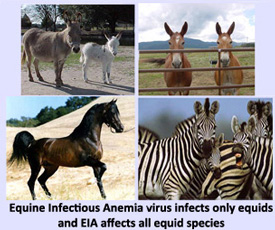TOPICS
- Home
- Challenges
- EIA Virus
- Transmission NEW!!
- Persistent Infection
- Pathogenesis
- Immune Response
- Diagnosis & Control
- Field Studies
- Publications NEW!!
- Links
- Contact and Credits
HOT TOPICS IN EIA RESEARCH
Equine Infectious Anemia
Program
Equine Infectious Anemia (EIA) is a devastating disease of equids. It is caused by a lentivirus. The main focus of our research has been to understand the intricacies of this disease and find effective ways to diagnose and control its spread. Vaccines to protect horses against the infection/disease are not available.
EIA became a major focus for the University of Kentucky (UK) Department of Veterinary Science in 1990 when Charles J. Issel, DVM, PhD, accepted the Wright-Markey Chair of Equine Infectious Diseases. Issel had served as a faculty member at the Louisiana State University School of Veterinary Medicine and Department of Veterinary Science in the College of Agriculture since 1974. At LSU he developed extensive research collaborations with scientists in the Entomology and Biochemistry departments.
Since 1990, the EIA program at UK has continued with major inputs from scientists from the University of Kentucky (R. Frank Cook, PhD, and Sheila Cook, MSc), the University of Pittsburgh (major collaborator Ronald C. Montelaro, PhD-currently Professor and Co-Director for the Center for Vaccine Research at Pitt), and the USDA-APHIS National Animal Health Programs, Riverdale, Maryland (Tim Cordes, DVM, Senior Staff Veterinarian, National Coordinator for Equine Programs). Recently the program has been enhanced by input from David W. Horohov, PhD, Mills Chair in Equine Immunology at UK.
Because our research had expanded on basic aspects of EIA, when HIV was shown to be related to EIAV our research team was able to successfully compete for additional research funds that have helped drive this program for the last 25 years. Please see the selected publication list for recent published articles from our group. Please look under topics in the index to find additional information on equine infectious anemia including the challenges that remain with EIA because life-long reservoirs of infection continue to evade our testing and control surveillance.
Updated on: February 17, 2010
